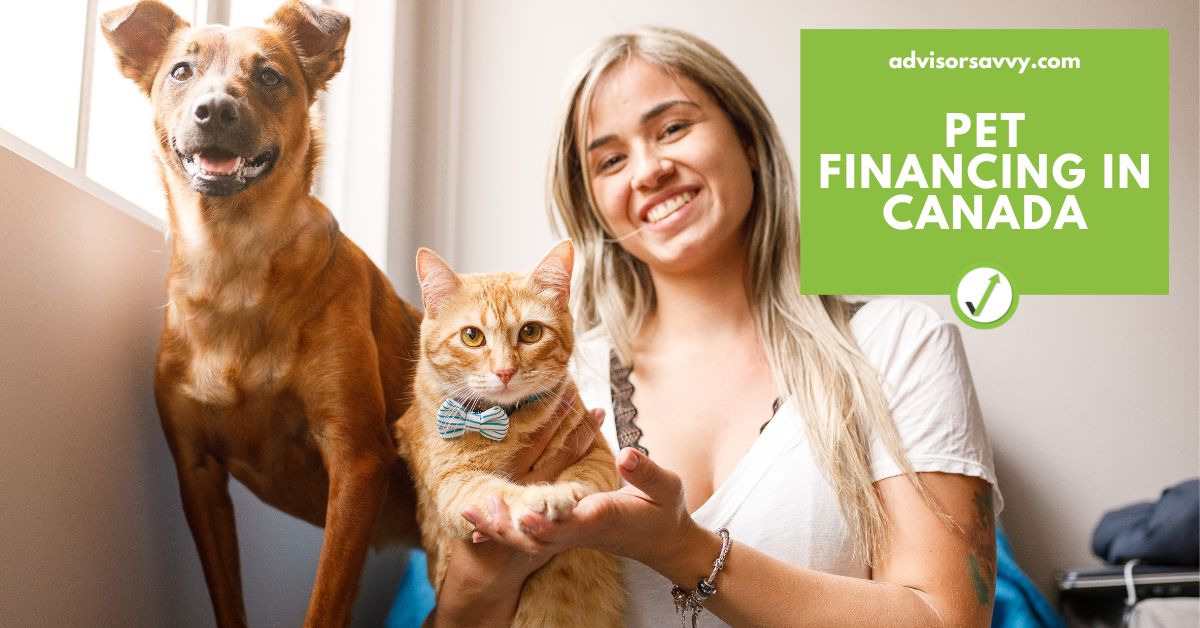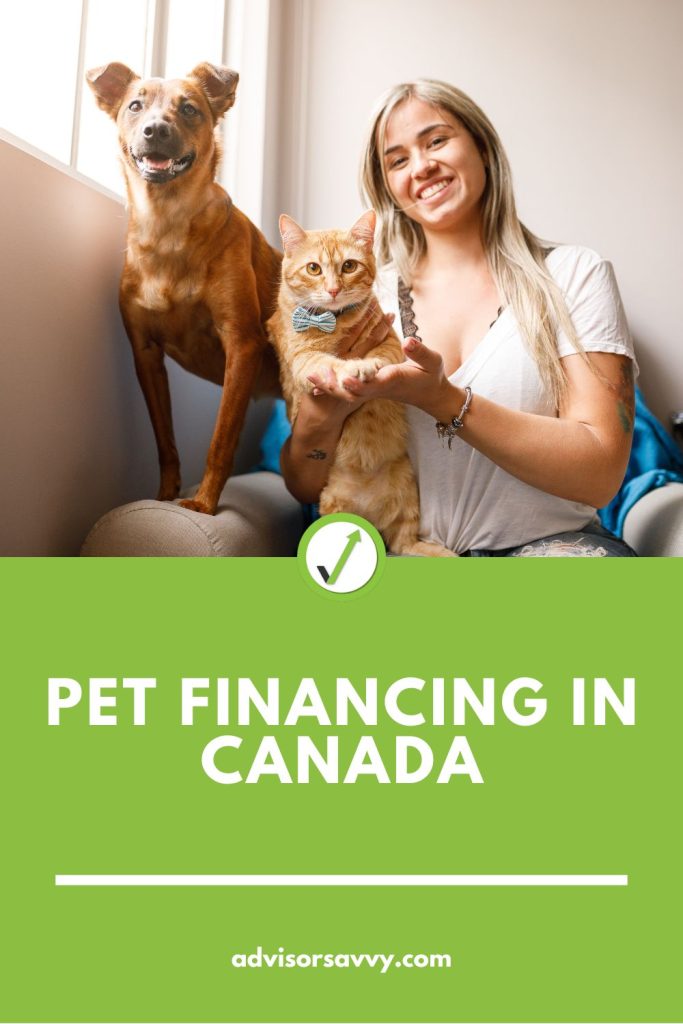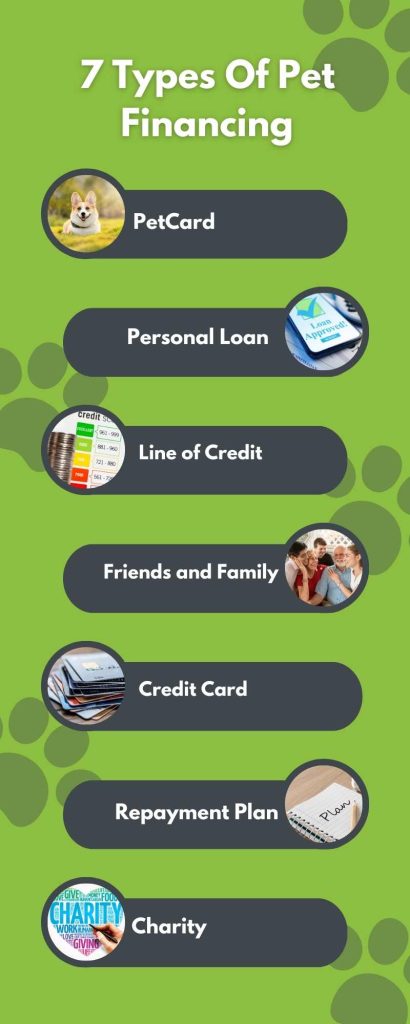
As pet owners know, furry companions are not free, and sometimes can be very expensive. This is particularly true when you run into an unexpected vet bill, such as emergency surgery or an unplanned vet visit. But what do you do when you can’t cover the cost incurred by your pet? Fortunately, you can always turn to pet financing in Canada. Learn about what pet financing is, the different types available and what happens if you struggle to pay in this article. Continue reading to ensure your pet gets the care they need!

Table of contents
What is Pet Financing?
In Canada, having a pet means additional costs. Things like food, kitty litter, toys, annual vet check-ups, shots and other day to day expenses for your furry friend usually don’t break the bank. But emergency surgery or an unexpected visit to the vet can cut deep into your pockets. These expenditures are the responsibility of the owner and can only be subsidized by pet insurance, if you have it. If you don’t have pet insurance, or your insurance doesn’t cover the cost in question, then you might have to pay for it out of pocket. Don’t have the funds? That’s where pet financing comes in. Pet financing in Canada is lending dedicated towards vet bills, pet surgery and any other cost related to your animal.
How does pet financing work?
There are a variety of ways to conduct pet financing, but typically it’s through a personal loan. Here’s the step by step process:
- Apply for pet financing with a lender
- Upon approval, obtain a lump sum of cash
- Use the cash to cover the pet cost
- Start making regular, scheduled payments on your loan until it’s paid off
With that in mind, you can also secure pet financing through a line of credit or credit card. In these instances, you would use the credit available to you to cover the cost of the pet debt.
Related Reading: Best Cat Insurance Canada
Understanding the Need for Pet Financing in Canada
In 2021, it cost roughly $3,724 a year to own a dog. Cats were slightly cheaper at $2,542 per year. Some Canadians might own other kinds of animals, like hamsters or fish, but this gives you a general idea of how much it costs to have a pet in Canada. Furthermore, here’s a breakdown of the typical costs you can expect to incur for cats and dogs:
| Treatment | Dogs | Cats |
| Parasite Prevention | $241 | $135 |
| Exams & Vaccines | $175 | $175 |
| Wellness Profile & Blood Work | $135 | $135 |
| Dental Cleaning | $652 | $652 |
| Pet Insurance Premiums (Monthly) | $39 | $29 |
| Food | $1,132 | $544 |
| Supplies | $120 | $240 |
| Spay/Neuter | $230 | $110 |
There are also one time costs to consider with pet ownership, such as adoption fees or the purchase of a carrier. You may also have to consider costs that will arise at the end of your pet’s life, such as putting them down or pet cremation.
Another item is the cost of surgery or unexpected vet bills. Let’s say your house cat dashes out the door and gets hit by a car, they’d need emergency medical attention to survive. Alternatively, if your vet discovers your dog has cancer, they may need to remove the tumor before it spreads any further. Whatever it is, these unexpected bills can get up in the thousands.
As you can see, owning a pet isn’t exactly cheap and that’s why some Canadians turn to pet financing. Fortunately, you have options to help out your fuzzy companion.

Types of Pet Financing in Canada
If you need pet financing in Canada, there are a variety of options available to you. Let’s take a closer look below.
Petcard
Since 1996, Petcard has helped Canadians with veterinary finance programs. According to their website, no down payment or collateral is required. There is no early payment penalty for your loan and monthly payments can be low depending on the term you choose. Finally, the application process is quick which allows you to get financing for your pet when you need it most. Petcard offers competitive interest rates based on the applicant’s credit history. If you don’t have great credit, expect to pay a bit more on your loan.
Personal Loan
Personal loans can be used for a variety of purposes, including pet financing. They are usually easy and quick to obtain. Although, personal loans are usually unsecured which means you might incur a higher interest rate. In addition, they have strict repayment terms so be sure to keep up with your payments.
Line of Credit
With low interest and flexible repayment terms, a line of credit is a great way to finance costs for your pet. Obtaining a line of credit can be challenging when you’re in a crunch, such as for unexpected pet financing. But once you have a line of credit, you can continue to use it indefinitely for any purpose.
Credit Card
Pet financing is possible with a credit card as well. But keep in mind the average credit card interest rate is 20%. If you don’t expect to repay the balance within a reasonable period of time, then it might be better to explore other options.
Friends & Family
If you’d prefer not to take out pet financing, consider asking friends and family for a loan instead. This way you might even be able to save on interest and can repay it when you have the cash.
Repayment Plan with Care Provider
Many vets are in their line of work because they want to help animals. For this reason, clinics and emergency care providers often allow you to pay your bills on a repayment plan. Ask the provider what options they have and see if it works with your personal finances.
Charities
There are charities in Canada that help pet owners cover the cost of veterinary bills. Do some research in your area to see if there’s any charitable organizations that could help you cover costs related to your pets.
Related Reading: Best Dog Insurance in Canada
Can you get a personal loan for a pet?
Yes, you can use a personal loan for pet financing. However, the interest rate might be higher than other options available for pet financing in Canada.
What credit score do you need to finance a pet?
Ultimately, the credit score requirements depend on the lender and the parameters of your financing application. However, a general benchmark is 580 or higher. If you’re lower than this limit, you might struggle to obtain pet financing in Canada. If you do obtain financing, expect a higher interest rate.
What do vets do if you can’t pay in Canada?
In most cases, vets will invoice you for their services and you’ll have a period of time to pay the balance. For larger bills, most vets understand you might need some time to come up with the funds and often give you up to 30 days to settle the debt.
If you still can’t pay, some vets offer repayment plans that are more manageable for their customers. Lastly, some vets may direct you towards charitable organizations that help pet owners manage the costs of pet ownership.
In the event that you can’t settle your vet debt, there is a chance it could go into collections. However, the terms of payment depends on the vet. Some may be more strict and require partial or full payment upfront before services are provided. Or some may forgive debt if it was partially paid or very old. It’s wise to get to know your vet and their payment policies so you can plan accordingly.

Match to your perfect advisor now.
Getting started is easy, fast and free.
How to Choose the Right Pet Financing Option in Canada
As we learned in this article, owning a pet isn’t free and can come with some large, unexpected costs. If you’re in a pinch, you might need to secure pet financing in Canada. There are a ton of options available, so it’s just a matter of choosing one that works for you. Be sure to consider your credit score, budget, and timeline. From there, navigate all of your options and choose the best one.
Read More: Trupanion vs Petsecure: Which one is better?
